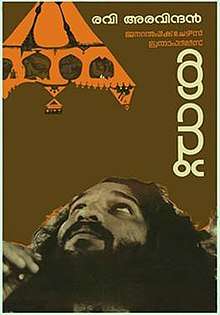Thampu
Thampu (transl. The Circus Tent) is a 1978 Malayalam-language film written and directed by G. Aravindan. Bharath Gopi, Nedumudi Venu, V. K. Sriraman, Jalaja the artistes of the Great Chitra Circus form the cast. The film deals with the roving street circus of Kerala. It is shot in black and white in a direct documentary mode.[2][3]
| Thampu | |
|---|---|
 Poster | |
| Directed by | G. Aravindan |
| Produced by | K. Ravindran Nair[1] |
| Written by | G. Aravindan |
| Starring | Bharath Gopi Nedumudi Venu V. K. Sriraman Jalaja Artistes of the Great Chitra Circus |
| Music by | M. G. Radhakrishnan |
| Cinematography | Shaji N. Karun |
Production company | General Pictures |
Release date |
|
Running time | 130 minutes |
| Country | India |
| Language | Malayalam |
Plot
Besides a long glittering river some men raise a pole. A tent balloons up. Where there was wide sand and the sound of water lapping, there is now a truck, chairs, hoops, stools, ropes, goats, a lioness, a pair of fat girls, some bicycles, and an old man with a philosopher's dignity, putting on white paste.
Across a dirt road, the circus truck comes to a village. The tent goes up. Schoolboys run to the tent. Village women come and watch an acrobat roll a hoop across a tightrope. A lion leaps from the edge of one stool - across darkness - on to another stool. A gap-toothed old woman gazes at a goat on a tight rope; her eyes are wide with curiosity.
For three days the circus makes small ripples in the life of this village. Municipal permits are required. At a toddy shop, a soldier befriends the circus strongman; a pump attendant sits on a rock each day watching a village girl bathe and dry her hair. The dwarf brings back to the circus a watermelon larger than his head.
In the film's three days, we, the viewers, learn the geography of the village: the banyan tree with leaves like transparent film, the shining water, the light on the sand at sunset. When the circus leaves the village, it leaves us. The narrative says: The circus comes and leaves; life goes on.
Cast
- Nedumudi Venu
- Jalaja
- V. K. Sreeraman
- Bharath Gopi
Soundtrack
The music was composed by M. G. Radhakrishnan and the lyrics were written by Kavalam Narayana Panicker.
| No. | Song | Singers | Lyrics | Length (m:ss) |
|---|---|---|---|---|
| 1 | "Kaanakappennu" | Usha Ravi | Kavalam Narayana Panicker | |
| 2 | "Kaanakappennu" (No BGM) | Usha Ravi | Kavalam Narayana Panicker | |
| 3 | "Oru Yamunaanadi" | Usha Ravi | Kavalam Narayana Panicker | |
| 4 | "Sreepaalkkadalil" | M. G. Radhakrishnan, Kavalam Sreekumar | Kavalam Narayana Panicker |
Major awards
- National Film Award for Best Direction – G. Aravindan
- National Film Award for Best Cinematography – Shaji N. Karun
- National Film Award for Best Feature Film in Malayalam
- Kerala State Film Award for Best Direction
- Kerala State Film Award for Second Best Film
References
- C. S. Venkiteswaran (19 June 2009). "The alchemist of cinema". The Hindu. Retrieved 11 April 2011.
- "Aravindan's profile". India Film database. Retrieved 11 April 2011.
- Sashi Kumar (2–15 January 2010). "Aravindan's art". Frontline. Retrieved 11 April 2011.